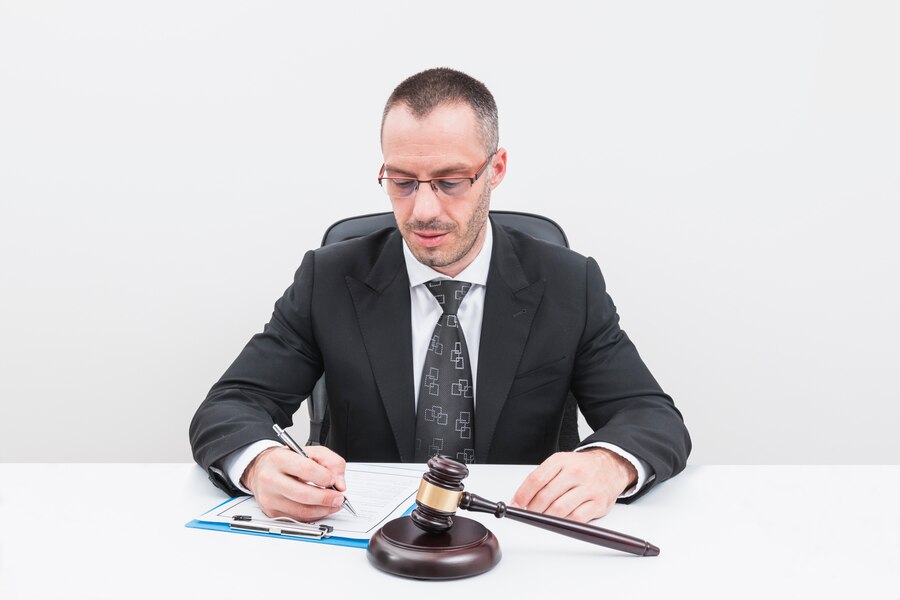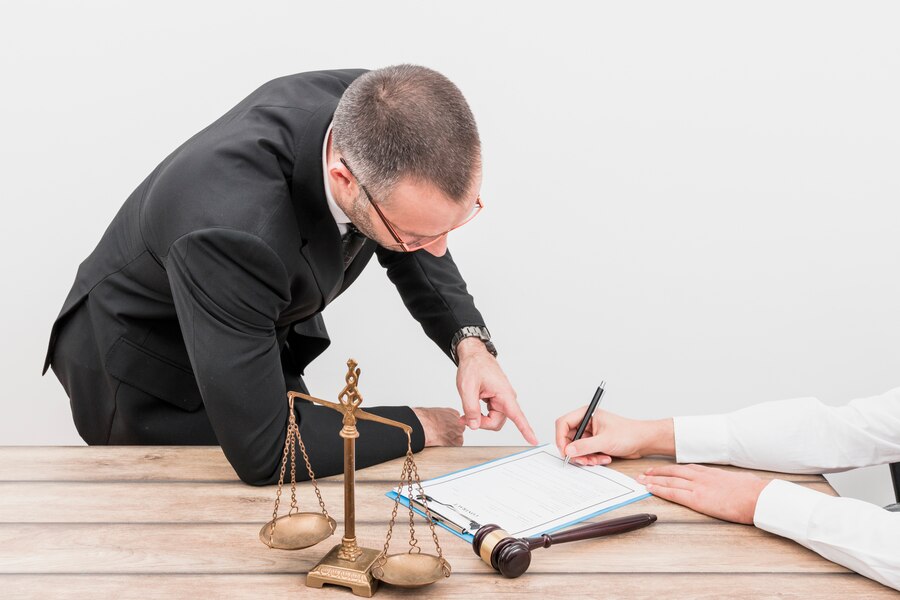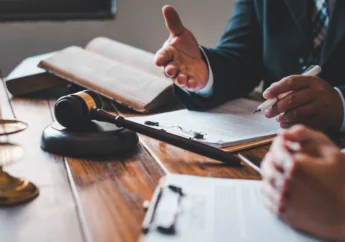The Difference a Skilled Criminal Defense Lawyer Can Make In Your Case
by Barsha Bhattacharya Legal 13 February 2024

In the complex, often intimidating world of criminal law, the quality of your defense lawyer can significantly alter the course and outcome of your case. A skilled criminal defense lawyer does not simply represent a client in court; they navigate intricate legal processes, interpret and apply nuanced legal knowledge, handle the dynamics of the courtroom, and mitigate the severity of potential penalties.
These professionals serve as invaluable pillars of support during what can be an emotionally taxing period. However, the question remains: what exactly differentiates a merely competent lawyer from a truly exceptional one, and how does this distinction affect the outcome of a criminal case? To comprehend the full implications, we must examine the role and skills of a top-notch defense lawyer in greater detail.
Understanding Criminal Defense

To fully comprehend the role and importance of criminal defense, it is imperative to analyze the intricacies of the judicial system and the indispensable part a skilled lawyer plays within it. A criminal defense lawyer is not merely an advocate, but a guardian of legal ethics and defendant rights, ensuring that the law’s scales remain balanced.
Diving into legal ethics, these principles guide the behavior of attorneys, demanding that they uphold the law’s integrity, even when faced with challenging situations. In a criminal case, a defense lawyer operates under this ethical framework, ensuring fair treatment and protection of a defendant’s rights.
This brings us to the crux of defendant rights. In the labyrinth of justice, these rights act as a beacon, ensuring that the accused is treated humanely and justly. They cover a wide spectrum, including the right to a fair trial, the privilege against self-incrimination, and the right to legal representation. A skilled lawyer is the custodian of these rights, ensuring they are not infringed upon.
In essence, understanding criminal defense requires acknowledging the dual role of a defense attorney – as an upholder of legal ethics and a protector of defendant rights. This understanding underscores the vital role such lawyers play in the judicial system.
The Role Of a Defense Lawyer
The role of a defense lawyer extends beyond the courtroom; they shoulder a multitude of responsibilities that are crucial for the fair representation of their client. They navigate complex legal challenges, ensuring that the law serves justice, not just prosecution. Their expertise and skills are vital in maintaining the balance of our legal system, underscoring the need for adept criminal defense lawyers at the RGSG law firm.
Defense Lawyer’s Responsibilities

Shouldering a myriad of duties, a criminal defense lawyer stands as a crucial pillar in the justice system, with responsibilities ranging from scrutinizing evidence to negotiating plea bargains. These professionals must adhere to stringent ethical obligations and maintain strict client confidentiality.
Ethical Obligations:
Upholding the law: Defense attorneys must operate within the law, ensuring all actions taken are legal and ethical.
Client representation: Lawyers are obligated to represent their clients to the best of their abilities, regardless of personal beliefs about the client’s guilt or innocence.
Client Confidentiality:
Protecting client information: Defense attorneys are expected to protect all information shared by a client, as confidentiality is a cornerstone of the attorney-client relationship.
Respecting privacy: Lawyers must respect their client’s privacy, not divulging any personal or case-related information without explicit consent.
Navigating Legal Challenges
Navigating the intricate maze of legal challenges is a critical role of a defense lawyer, whose expertise and strategic acumen can often mean the difference between conviction and acquittal for their clients. They are adept at identifying legal pitfalls, reducing the risk of unfavorable outcomes. Understanding legal nuances can circumvent potential hazards, thus enhancing the chances of a successful defense. Moreover, a skilled defense attorney is well-versed in courtroom etiquette. This knowledge is crucial, as improper conduct can detrimentally affect a case. They ensure their clients are fully prepared and adhere to courtroom decorum, thus fostering respect and credibility. Their proficiency in managing legal challenges and maintaining courtroom etiquette can significantly influence the verdict, highlighting their indispensable role in the justice system.
Skills Of A Top-Notch Lawyer

In the complex realm of criminal law, a top-notch lawyer must possess a precise blend of skills that not only demonstrate their legal prowess, but also their ability to effectively and persuasively advocate for their clients. The lawyer’s communication skills and ethical considerations are paramount, and these play a crucial role in their ability to handle a client’s case effectively.
Key skills of a top-notch lawyer include:
Lawyer’s Communication: This is a two-pronged skill that involves both listening and speaking. A good lawyer must be able to understand their client’s needs, gather information efficiently, and understandably express complex legal ideas.
Listening: This allows the lawyer to fully grasp the client’s situation and formulate an appropriate defense strategy.
Speaking: This enables the lawyer to effectively communicate the client’s case in court, negotiate deals, and clarify legal advice to the client.
Ethical Considerations: A top-notch lawyer must demonstrate high ethical standards, respecting client confidentiality, avoiding conflicts of interest, and maintaining honesty with the court.
Confidentiality: The lawyer must protect the client’s private information.
Honesty: The lawyer must uphold the truth, even when it’s not in their client’s favor.
These skills contribute to the lawyer’s overall effectiveness and ability to secure the best possible outcome for their client.
Navigating Complex Legal Processes
Beyond possessing essential skills such as effective communication and high ethical standards, a proficient criminal defense lawyer must also demonstrate an adept ability to guide their clients through the labyrinth of complex legal processes. Their mastery of the legal terrain is crucial to effectively navigating these processes, which often involve intricate procedures and terminologies that can be overwhelming to the untrained eye.
One key area where this expertise comes into play is in the exploration of legal loopholes. An astute lawyer can identify and exploit these loopholes to either build a solid defense or challenge the prosecution’s case. This strategic maneuvering could mean the difference between a guilty verdict and an acquittal, illustrating the significant impact a skilled lawyer can have on the outcome of a case.
Another critical component is the jury selection strategy. An experienced lawyer understands that the composition of the jury can significantly sway the case’s outcome. Therefore, they meticulously analyze potential jurors’ profiles and use their insights to select a jury that may be more sympathetic to the client’s cause. This strategic approach often proves instrumental in securing favorable verdicts for clients, further underlining the pivotal role a competent criminal defense lawyer plays in navigating complex legal processes.
Importance Of Legal Knowledge
The effectiveness of a criminal defense lawyer is underpinned by their depth of legal knowledge. Proficiency in understanding legal jargon and navigating complex legislation are crucial factors in providing robust, strategic defense. A lawyer’s ability to interpret and apply the law can significantly influence the outcome of a case, underscoring the importance of comprehensive legal knowledge.
Understanding Legal Jargon
Mastering legal jargon significantly enhances the effectiveness of a criminal defense lawyer, as it fosters a clear understanding of complex legal concepts and promotes precise communication in the courtroom. In essence, deciphering legalese means turning complicated legal terms into simplified language that can be readily understood by all parties involved.
Understanding Legal Jargon:
‘Deciphering Legalese’: This involves translating complex legal language into simpler, more comprehensible terms. It requires an in-depth understanding of the law and its nuances.
‘Legal Terminology Simplified’: This is the process of breaking down intricate legal phrases into digestible, easy-to-understand language, making legal proceedings more accessible.
‘Importance of Legal Knowledge’: A firm grasp of legal terminology not only aids in communication but also equips a lawyer to construct compelling arguments and present a robust defense.
Navigating Complex Legislation
Having established the significance of understanding legal jargon, it is imperative to recognize that such knowledge is fundamental to navigating complex legislation, a cornerstone of effective criminal defense practice. In the maze of statutory complexities, expert legislation interpretation is key. A skilled defense lawyer, well-versed in the intricacies of the law, can adeptly steer a case through the labyrinth of legal provisions, ensuring that every potential loophole is explored and every possible defense is advanced. This proficiency not only aids in deciphering the nuances of legislation but also influences strategic decision-making, shaping the direction of the case. Thus, the importance of legal knowledge, particularly in terms of navigating complex legislation, cannot be overstated in the realm of criminal defense.
Assessing Evidence Effectively
In the realm of criminal defense, an attorney’s proficiency in scrutinizing and interpreting evidence can significantly tilt the scales toward a favorable courtroom outcome. The ability to dissect complex evidence, identify potential issues such as evidence manipulation risks, and challenge unlawful search scenarios can be the difference between a guilty verdict and an acquittal.
An adept defense lawyer employs the following strategies for effective evidence assessment:
Understanding legal parameters: Ensuring that evidence is procured legally is crucial. Unlawful search scenarios can lead to the exclusion of critical evidence.
Recognizing illegal search and seizure
Challenging surveillance overreach
Highlighting breaches of due process
Identifying evidence manipulation risks: A rigorous examination of the evidence is crucial to spot any discrepancies or potential manipulation.
Scrutinizing chain of custody
Challenging forensic findings
Detecting tampering or alteration
Interpreting evidence contextually: Evidence should not be viewed in isolation but within the context of the case.
Analyzing relevance and reliability
Assessing corroborating or contradicting evidence
Evaluating the impact on the overall case narrative
Such analytical scrutiny of evidence not only bolsters the defense strategy but also aids in exposing any potential prosecutorial overreach or misconduct, thus ensuring a fair trial.
Crafting A Strategic Defense
The cornerstone of effective criminal defense lies in the ability to craft a strategic defense, a process deeply rooted in the meticulous analysis of case details and the adept application of legal tactics. This entails a thorough examination of the case’s intricacies, which then fuels the development of a robust, tailored defense strategy. The successful implementation of this strategy can significantly influence the outcome of the case, underscoring the crucial role of a skilled criminal defense lawyer.
Analyzing Case Details
Through meticulous examination of case details, a skilled criminal defense lawyer can craft a strategic defense that addresses each allegation effectively and persuasively. Central to this process are evidence interpretation and client communication.
Evidence interpretation:
The lawyer scrutinizes every piece of evidence, identifying any inconsistencies or weaknesses that could undermine the prosecution’s case.
This analysis extends to understanding how the evidence was gathered, ensuring its validity and legality.
Client communication:
The attorney maintains open and regular communication with the client, ensuring they are informed of every development.
This dialogue aids in building a mutual understanding of the case, enabling a more robust defense.
Implementing Legal Tactics
Masterful application of legal tactics serves as the cornerstone in crafting a strategic defense, an essential process that can sway the scales of justice in favor of the accused. By identifying legal loopholes and implementing specific defense techniques, a skilled attorney can create a robust strategy that challenges the prosecution’s evidence and narrative.
The discovery of legal loopholes can lead to the dismissal of charges, while the effective use of defense techniques such as establishing an alibi or questioning the validity of evidence can raise doubt about the defendant’s guilt. These tactics require a deep understanding of the law and the ability to think creatively and analytically. Thus, a seasoned criminal defense lawyer’s expertise in implementing legal tactics can prove invaluable in achieving a favorable outcome.
Negotiating Plea Bargains
In the realm of criminal defense, adeptly negotiating plea bargains is a crucial skill, often dictating the trajectory of a client’s case and potential sentencing. The attorney’s expertise in this area can significantly modify the course of events. By understanding Plea Bargain Ethics and effectively managing Prosecution Interaction, a skilled lawyer can tactfully reduce the severity of charges, decrease potential penalties, or even have charges dismissed.
These negotiations demand a delicate balance, requiring the defense attorney to uphold the highest standards of plea bargain ethics, respect the client’s best interests, and guarantee informed consent while maintaining honest communication with the prosecution. Additionally, mastering the art of prosecution interaction is essential. This involves understanding the prosecutor’s standpoint, identifying potential areas for negotiation, and building a compelling counter-argument to challenge the prosecution’s case. Furthermore, leveraging their understanding of the legal system is crucial for accurately predicting potential sentencing outcomes of various plea options and using this knowledge to negotiate the best possible outcome for the client.
In essence, a skilled criminal defense attorney’s ability to negotiate effective plea bargains can significantly influence the outcome of a client’s case, demonstrating the profound difference their expertise can make.
Handling Courtroom Dynamics
Beyond the nuanced negotiation of plea bargains, a competent criminal defense attorney must also expertly navigate the complex dynamics within the courtroom to effectively advocate for their client. This involves the strategic management of public perception and a deep understanding of jury selection insights.
Public Perception Management is a crucial element for a criminal defense attorney. They must counteract potentially damaging preconceptions and ensure that the defendant is viewed impartially, not prejudged based on charges alone. An attorney’s ability to communicate effectively, present compelling arguments, and retain a professional demeanor can significantly influence public opinion, swaying the outcome in their client’s favor.
Moreover, the attorney’s insights into jury selection can greatly impact a case’s result. The selection process is more than mere random selection; it’s a strategic process where an attorney assesses potential jurors’ profiles to identify those likely to be sympathetic to their client’s cause. An attorney’s ability to ‘read’ people and predict their biases or predispositions can be a game-changer in a trial.
Mitigating Severe Penalties

Navigating the stormy seas of criminal law, a seasoned defense attorney employs an arsenal of strategies to mitigate severe penalties, often leveraging procedural discrepancies, evidentiary weaknesses, and constitutional safeguards to minimize their client’s sentence. They expertly navigate the complex labyrinth of the legal system, persistently seeking opportunities for penalty reduction and relentlessly evaluating the consequences of every action.
The defense attorney’s role in mitigating severe penalties can be dissected into three main strands:
Procedural Discrepancies: They meticulously scrutinize the case for any procedural errors that could potentially invalidate the charges or lessen the penalties.
Incorrectly filed paperwork
Inadequate evidence collection
Violation of the defendant’s rights
Evidentiary Weaknesses: They rigorously question the credibility, relevance, and legality of the prosecution’s evidence, working to undermine the case against their client.
Challenging the authenticity of the evidence
Exposing biases in witness testimonies
Raising doubts about forensic findings
Constitutional Safeguards: They fiercely protect their client’s constitutional rights, defending against any infringement and using it to their advantage.
Ensuring the right to a fair trial
Safeguarding against self-incrimination
Upholding the presumption of innocence
Such strategies demonstrate the profound impact a skilled defense attorney can have on the outcome of a case. Their expertise not only aids in penalty reduction but also ensures a fair and just consequence evaluation.
Providing Emotional Support
An equally pivotal, yet often underemphasized, aspect of the defense attorney’s role involves providing emotional support and guidance to their clients throughout the often harrowing journey of criminal proceedings. The emotional turmoil that comes with criminal charges can be debilitating, and it is here that a skilled lawyer can play an invaluable part in fostering emotional resilience.
The lawyer’s role extends beyond the courtroom walls; they act as confidants and counselors, guiding clients through the complexities of the legal process, and helping them develop essential coping mechanisms. These mechanisms are essential to maintaining emotional stability, preventing stress-induced decision-making errors, and ensuring that the client’s mental health does not deteriorate during the proceedings.
Moreover, providing emotional support is a powerful tool to build trust and rapport between client and lawyer. It assures the client that they are not alone in their battle, fostering a greater sense of security and confidence. The emotional support provided by a skilled lawyer can be a beacon of hope in an otherwise bleak situation.
Case Study: Successful Defenses
While the emotional support provided by defense lawyers is crucial, the ultimate test of their skill lies in their ability to deliver successful defenses, as demonstrated in the following case studies.
Case Study 1:
Situation: The defendant was accused of a felony, with seemingly strong evidence against them.
Action: The attorney meticulously examined the prosecution’s evidence, uncovering procedural errors that violated the defendant’s rights.
Result: The court dismissed the case, upholding the principle of ‘innocent until proven guilty.’
Case Study 2:
Situation: The defendant, while technically guilty, was charged with a disproportionately severe penalty.
Action: The lawyer navigated complex legal waters, negotiating a fair and reasonable sentence considering the circumstances.
Result: The defendant received a lighter sentence, demonstrating the power of a skilled defense.
Case Study 3:
Situation: The defendant faced a jury likely to be biased against them.
Action: During jury selection, the attorney ensured a fair and impartial jury by challenging jurors with potential prejudices.
Result: The defendant got a fair trial, showcasing the importance of unbiased jury selection.
These cases underline the transformative role a skilled defense attorney can play, safeguarding a defendant’s rights, and ensuring justice is served.
Frequently Asked Questions
What Is the Average Cost of Hiring a Skilled Criminal Defense Lawyer?
The cost of hiring a skilled criminal defense lawyer varies greatly, influenced by factors such as the lawyer’s experience and offered payment plans. On average, expect to pay between $1,500 to $10,000.
How Long Does a Typical Criminal Defense Case Last?
The duration of a criminal defense case varies widely, influenced by case duration factors such as complexity, evidence, and court schedules. Prolonged trial consequences include increased costs and potential emotional distress for the defendant.
How Do I Find the Right Criminal Defense Lawyer for My Specific Case?
Finding the right criminal defense lawyer requires thorough research. Consider the lawyer’s expertise, track record, and case compatibility. Meet potential lawyers, review their approach, and ensure they have experience with cases similar to yours.
How Can I Better Understand the Legal Jargon Used in Court Proceedings?
Understanding legal jargon used in court proceedings can be achieved by learning legal terminology basics and utilizing jargon simplification techniques. This approach will enhance your comprehension and participation in your legal affairs effectively.
Are There Any Disadvantages to Hiring a Skilled Criminal Defense Lawyer?
While lawyer selection is crucial, potential disadvantages can include higher costs and possible overconfidence. Regardless, a skilled criminal defense lawyer usually ensures a robust defense strategy, increasing the chances of a favorable outcome.
Additionals:







































































































